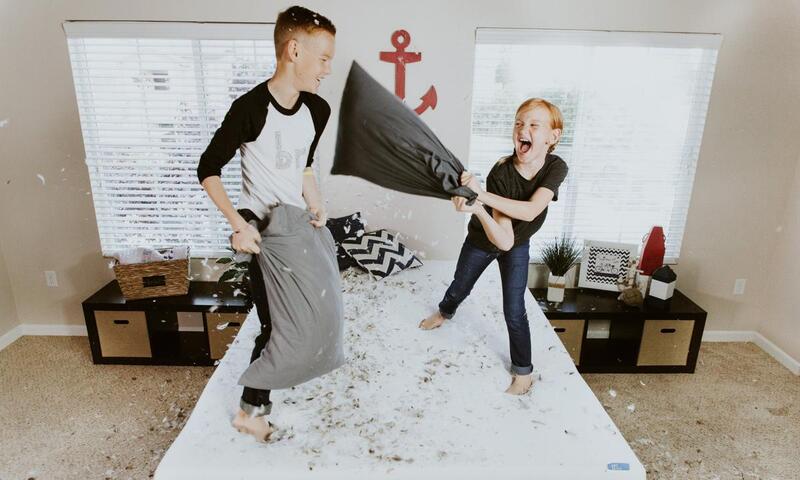10 Ways to Stay Sane While Sheltering at Home

We are experiencing unprecedented times, and living during a pandemic has altered our daily lives in ways that we never could have anticipated. We are required to “shelter at home” to help stop the spread of the virus. The silver-lining of this situation is that we get more time together with our loved ones. The challenge of this situation is that we get more time together with our loved ones! How can we make the best of this situation? The following are a few helpful ways to make this time together go a little more smoothly:
1 - Maintain an open and flexible attitude. Daily life is going to be different. We are not going to be able to do the things we normally do in the normal way. Tasks will take more time. Items will not be available. We are going to be more constrained. That’s just the way it is going to be for a while. If we can be a little more patient with each other and roll with the punches, it will be easier to deal with life.
2 - Keep that sense of humor - it’s critical! When we can keep a sense of humor, it makes it a bit easier to cope. In our neighborhood, we have a neighborhood web page. One man posted, “The governor just ordered me to shelter in our home with my wife for three weeks. I feel the need to tell someone that if I die, it wasn’t the virus that killed me.” (Perhaps I can share some of the resources the CMR has to offer with them…if he makes it out alive.)
3 - Develop a schedule. It is much easier to cope with a difficult situation when we have some structure. It can provide a measure of normalcy and can help to ground us. We can feel, and be, more productive with the concentrated time we will have at home. We might finally have time to take care of some of those items on our “honey-do” list!
4 - Keep a healthy lifestyle. It is important to try to eat right, get good sleep, and exercise (while keeping six feet away from others). When we do those things, we are going to feel better physically and emotionally. It is much more difficult to think and act in healthy ways when we are hungry, have ingested lots of sugar or caffeine, and/or are sleep deprived.
5 - Create pockets of space and time so that everyone can have some alone time if desired. Extroverts might love this close arrangement, but this point is especially important for those who are introverts. Having concentrated time together in a confined, communal space can be really tough. Sometimes we just need a little time to ourselves to breathe, relax, and get balanced so that we can enjoy being all together again. Designate an area and times of day when those who need to be alone can be.
6 - Find and build in a few pleasurable activities to do, both as a family and an individual. Enjoying pleasurable activities is good for our mental health. They brings us relaxation, comfort, and fun! Find things to do as a family, such as a popcorn and movie night, game night, and cookie bake-off. We can do things that we personally enjoy, such as reading a good book, crafting, doing pilates, or playing a musical instrument. Pleasurable activities build us up and refresh us, so that we can cope better.
7 - Have a frank, honest conversation as a family about expectations and responsibilities. It is so helpful to be able to talk together about what everyone is expecting, needing, and wanting. Then, together, we can develop a concrete, specific plan for who does what when. Everyone can pitch in and play a part. And, since everyone has a chance to share their thoughts and wants, we can more easily avoid the conflict that naturally comes from concentrated living together, which leads to the next point...
8 - Deal with issues and tensions as they arise. Don’t let tensions simmer. They tend to come out in hurtful and destructive ways when we let them build, especially when we are all cooped up together. Keep a short list. Be patient. Be empathetic. When bringing issues up, be kind in attitude, speech, and behavior. Be self-descriptive about how we are feeling and experiencing the situation, rather than accusing the other person. For example, instead of saying, “You play your music way too loud!”, we can say, “When your music is turned way up, I get a headache, and it makes it hard for me to concentrate. Would you mind either turning it down or using your headphones? Thanks!”
9 - Give people space to be upset. Sheltering at home can be close and confining. It might be too much for us at times. We can work to be empathetic and understanding with each other when those times happen, rather than just expecting or demanding that the other person put on a cheerful face and be happy. When we are empathetic, it actually makes it easier for the other person to calm down, relax, and be more positive.
10 - Encourage one another and stay connected. It is helpful to remember that we all are in this together. We need one another, and we can help each other to make this time more enjoyable and memorable. We can do things to encourage each other, such as writing notes of encouragement or doing meaningful acts of service for each other. We can check in with each other to see how others are doing, or to know how we might ease their stress. Social media can be helpful, but don’t spend all your time on it. We can pray together and for each other. We can remind each other that, as Christians, we can trust and have comfort in knowing that we have a Good Shepherd who cares for us, will lead us, and will take care of us.
We hope that these ideas will be helpful to you and your family as we go through this trial together. Use this time to encourage and connect with others so that when we are able to resume a more normal life, our families will be closer as a result!

.png)
